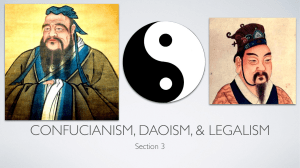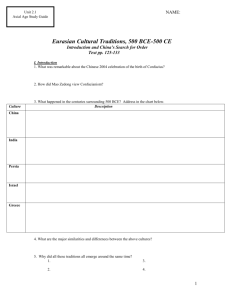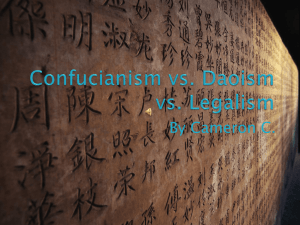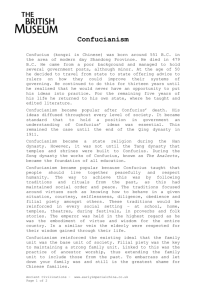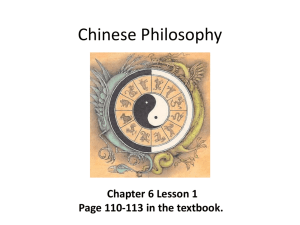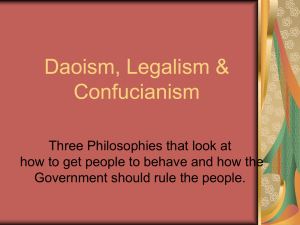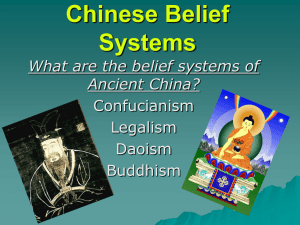Major Philosophies of China
advertisement
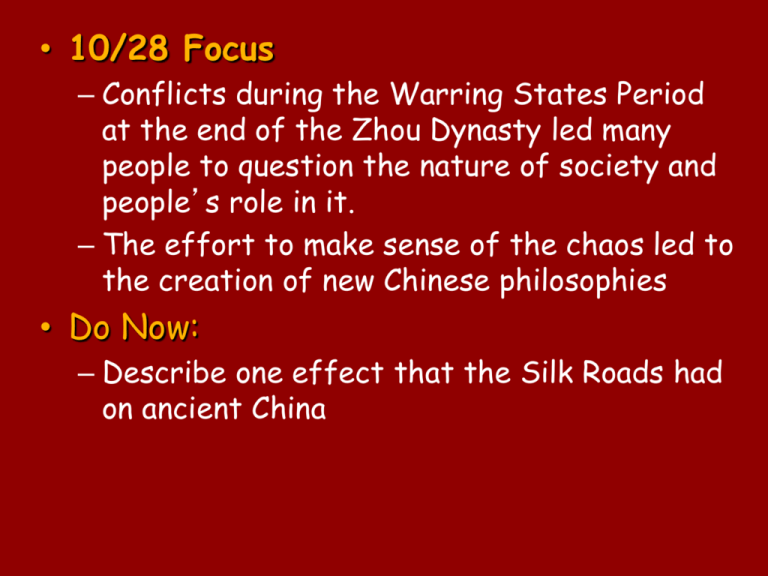
• 10/28 Focus – Conflicts during the Warring States Period at the end of the Zhou Dynasty led many people to question the nature of society and people’s role in it. – The effort to make sense of the chaos led to the creation of new Chinese philosophies • Do Now: – Describe one effect that the Silk Roads had on ancient China Major Philosophies of China Confucianism Legalism Taoism The Warring States Period • Warfare broke out between nobles at the end of Zhou dynasty – Led to period of upheaval and chaos – People began to think about the best way to restore: • Social order • Harmony • Respect for authority Confucius • 551 BC- 479 BC • Known as Kongfuzi • Chinese teacher and philosopher – Philosopher • A person who offers theories or ideas on “big questions” • Developed a theory of how to establish stability in China Confucianism • Confucius believed that: – People are naturally good • People should treat each other humanely – Importance of education in creating good, stable government • Need for educated civil servants – Individual must find and accept their proper place in society Confucianism • Believed society should be organized around five basic relationships o Ruler -----Subject o Father-----Son o Husband----Wife o Older Brother----Younger Brother o Friend----Friend The Five Relationship The Five Relationships • Example: – Rulers should practice kindness and virtuous living – Subjects should be loyal and law abiding • Stressed importance of: – Family – Filial Piety • Children should respect their parents and elders – Worship ancestors – Patriarchal society – Education Major Principles of Confucianism Li --> Rite, rules, how you should act in a community Ren --> humaneness for others; helping others Shu --> Reciprocity, empathy Do not do unto others what you would not want others to do unto you. Yi --> Righteousness and morality Xiao --> Filial Piety (Respect your parents and elders) The Analects • Book containing Confucius thoughts on how to improve society • Became the basis for Chinese civil service exams and bureaucracy – Government workers Significance of Confucianism • Cornerstone of Chinese tradition and culture – Adopted by most Chinese • preserved patriarchal society • Spread to areas that were under China’s control or influence – Korea and Vietnam Closure • What is Filial Piety? • What impact did Confucianism have on China? Filial Piety •The Master [i.e. Confucius] said, “In serving his parents the filial son is as reverent as possible to them while they are living. In taking care of them he does so with all possible joy; when they are sick he is extremely anxious about them; when he buries them he is stricken with grief; when he sacrifices to them he does so with the utmost solemnity. These five [duties] being discharged in full measure, then he has been able [truly] to serve his parents.” • 10/30 Focus: – The Qin adopted the philosophy of legalism and used it to maintain strict control of the Chinese population – Lao Tzu encouraged people to seek a balance with nature by following the Taoist philosophy • Do Now: – Filial Piety was one of Confucius’s main teachings . What is filial piety? Legalism • Founded by Han Feizi – Lived during the Warring States period • Became the political philosophy of the Qin Dynasty Principles of Legalism • Human nature is naturally selfish; humans are by nature evil • Rulers needed to be strong and govern through force • Laws must be strict and based on rewards and punishments to maintain order – Supported harsh penalties • Branding and mutilation for minor crimes Principles of Legalism • Placed little value on education – should be controlled by government • Ideas needed to be strictly controlled – Rulers should burn all writings that are critical of the government • War is needed to strengthen the rulers power Daoism • Founded by Lao Zi • Began during the Warring States Period • Stressed importance of balance in nature – Yin – Yang Feminine Passive Darkness Cold Weak Earth; Moon Masculine Active Light Warmth Strong Heaven; Sun Daoism • “The Way” – The Tao • A universal life force that is present in nature • Guides all things – Human understanding of nature and harmony achieved by following “the way” Daoism • Believed that education and politics are not necessary for harmony – Natural flow of events would solve problems • Rely on senses and instincts • Stressed importance of individuals and less government How do we best achieve social order and harmony in society?? Confucianism --> Moral order in society. Legalism --> Rule by harsh law & order. Daoism --> Freedom for individuals and less govt. to avoid uniformity and conformity. Closure • How was Legalism used by the Qin to control the people of China? • What role does balance play in the Daoist teachings? • 10/31 Focus: – China’s river valley civilizations laid the foundations of Chinese culture. Important Chinese philosophies , Confucianism, legalism, and Taoism developed. • Do Now: – Identify one difference between legalism and Confucianism China Review • What are two natural barriers that influenced the development of civilization in China? • Identify one effect these barriers had on China China Review • What is this structure • What does it tell us about the Chinese view of the outside world? China Review • What trade route is shown in this map? • What impact did it have on China? China Review China Review • Explain the process that is shown in this image? China Review Zhou Dynasty Qin Dynasty Shang Dynasty Han Dynasty Warring States Period China Review Han Feizi Lao Tzu The Analects Developed during warring states period The Five Relationships Ways to establish order in society Placed little value on education “The Way” Confucius The Han Feizi Filial Piety The Way of Virtue Seek a balance with nature Placed high value on education rather than punishment Harsh penalties for breaking laws Strict control of education and free thinking
